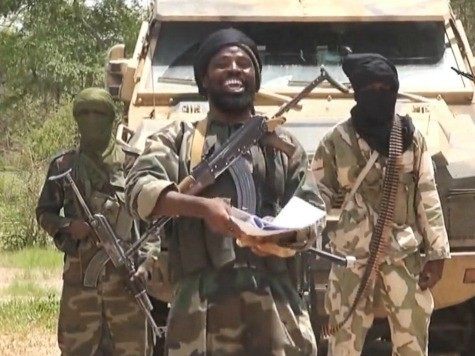The Islamist terror group Boko Haram has taken control of a territory in Nigeria the size of Ireland. It continues its efforts to expand within the west African nation and establish an Islamist Caliphate, now with the support of the Middle Eastern Islamic State (ISIS) terror group. While headlines are quick to mention the dead, it is Nigeria’s internally displaced, now numbering upwards of one million, who continue to suffer as they flee the group.
Speaking to the United Nations on Tuesday, Nigeria’s Attorney General Mohammed Bello Adoke called for the international community to send help not just to the military, but to civilians wandering northeast Nigeria attempting to resettle as far from Boko Haram strongholds as possible. “Since the insurgency began, close to 650,000 Nigerians have been internally displaced in the North Eastern part of Nigeria and another one million, as refugees in neighboring countries of Cameroon, Chad and Niger,” Adoke said. The million that have been displaced outside of Nigeria mostly lived in towns bordering the northeastern Nigerian states of Borno, Yobe, and Adamawa– the states most devastated by Boko Haram’s terror spree.
Within Nigeria, both religious and educational institutions are attempting to properly feed and clothe hundreds of thousands of refugees. The American University of Nigeria, which lies in the capital of Adamawa, Yola, has taken in 270,000 people on its own, including girls and women who escaped Boko Haram after being abducted during the Chibok school raid that made Boko Haram an international news story.
Writing for BBC, the president of the University, Margee Ensign, notes that the university is at least at a safe distance from Boko Haram territory but that it simply does not have the resources to feed and house the hundreds of thousands who have taken refuge there for longer than this month. “Even if Boko Haram were suddenly defeated and no more displaced people came to Yola, people will shelter in Yola for the foreseeable future,” Ensign writes, noting that most of those displaced would not have the means to return home immediately even if they could.
Ensign describes the process for sheltering refugees. She notes that the government is almost entirely absent from caring for them; many stay at religious institutions, the universities, or private homes. “Some Yola residents, including one of AUN’s drivers, have as many as 50 displaced persons living with them in their homes,” she recounts. She notes that Christians and Muslims are living side by side in churches and mosques. Most refugees are women and have lost all their male family members. One church refused to take in men for food distributions, as “the men were disorderly and at times unruly,” but there were not many with whom to contend.
“When we asked, ‘Where are your boys and husbands?’ the women cried and then turned quiet. Finally one said, ‘They were burned or forced to join Boko Haram,'” Ensign states.
Ensign’s story highlights the humanitarian crisis created by Boko Haram that often receives fewer headlines than their violent activities or the military movements organized to stop them. Long after the African states defeat Boko Haram, millions will live with the trauma of having experienced their terrorist acts firsthand.
The military actions to defeat Boko Haram appear to have hit a standstill due to disconnects between the nations participating in the efforts to defeat the group. Chad’s Daily Trust newspaper reports that the Chadian army is struggling to find its place in the struggle in Nigeria after participating in a number of successes that include the recapture of the town of Baga, in which Boko Haram slaughtered 2,000 people in one day.
A spokesman for the Chadian army told Reuters that Nigeria had requested they step back. “We turned back because Nigeria did not authorise us to go any further,” said spokesman Colonel Azem Bermandoa. Unnamed diplomats suggested that Nigeria did not want its army to be “embarrassed” compared to Chad’s army and its successes, particularly given that President Goodluck Jonathan is campaigning for reelection this month.
While the Daily Trust notes that Nigerian military spokespersons have said nothing negative about the coalition, instead claiming their work together has brought a number of successes against the terrorist group, Chadian officials claimed “there have been no joint operations between the two forces,” and unnamed officials from the other nations participating in the fight–Niger and Cameroon in particular–have echoed those concerns.
Boko Haram has, meanwhile, endeavored to increase the quality and frequency of its propaganda releases. In a video that appears very similar to the propaganda released by the Islamic State, Boko Haram members can be seen beheading a man in a video the group published on social media Monday. In addition to the beheading, which is the first known video by Boko Haram showing an execution in this manner, the video showcases the Islamic State flag in the upper right-hand corner.

COMMENTS
Please let us know if you're having issues with commenting.